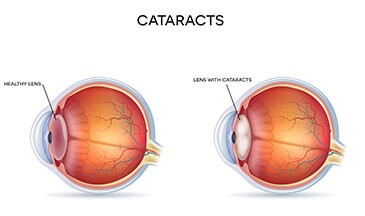Does Cataract Surgery
Last a Lifetime?
Cataracts that cloud, blur, or block your vision are an extremely common problem. In fact, Over 25 million Americans suffer from cataracts. It’s an issue we see daily at Brooks Eye Associates, and our cataract surgeons have treated countless patients for it.
Since cataracts naturally develop in those over age 40, patients that come to us for this procedure often ask: does cataract surgery last a lifetime? At Brooks, we’re happy to answer that yes, it does, and there are numerous other benefits to undergoing cataract surgery.
What Are Cataracts?

The eyes focus using two tools: the cornea and the lens. The cornea, the transparent front of the eye, does the heavy lifting by focusing light. The lens, meanwhile — a clear, flexible tissue behind your pupil — interprets the images, sending information to the retina, the part of the eye that communicates with the brain.
Sometimes, proteins can gather in the lens or the lens tissue becomes less flexible, which clouds or blurs vision. This can affect overall vision clarity, color perception, and your ability to see at night or with the presence of glare. It can also cause double-vision, halos around lights, and nearsightedness.
What Causes Cataracts?
The most common cause of cataracts is aging. For many people, cataracts begin to develop around 40 years of age, although it may not be noticeable until they reach their 60s. It can result from some infections, nutritional deficits, and diseases, such as diabetes, or come from eye trauma. In rare cases, it may be inherited.
Steps can be taken to prevent cataracts before cataract surgery becomes necessary. Regular eye exams help, as does wearing your prescription glasses or contacts.
Another, potentially surprising, cause of cataracts is smoking cigarettes. Smoking both oxidizes cells and introduces foreign substances into your system, which can increase your chance of developing cataracts.
The Dangers of Cataracts
Some of the negatives of living with cataracts aren’t surprising. With your ability to handle glare and night vision lessened, you’ll struggle to see clearly, both in the bright light of day and the dark of night. This also means you can no longer drive at those times. Your ability to read will also be negatively impacted.
There are more direct health implications, as well. Poor vision can increase your chances of falling and injuring yourself. And vision loss has been directly linked to depression and anxiety.

Cataract Surgery
Cataract surgery involves removing the clouded natural lens and replacing it with an artificial, intraocular lens (IOL). This is done through a small incision in the cornea. The size of that initial incision, as well as how anesthesia is administered, can impact the length of cataract surgery recovery.
Dr. Brooks specializes in the “no stitch” cataract surgery, which is the least painful and has the shortest recovery time. Topical anesthesia is used, as opposed to shots, which forgoes the need to break skin or cause swelling. During the procedure, the cataract is broken up before being removed, which allows the incision to be as small as possible. It’s so small, in fact, that it self-heals.
Between the topical anesthesia and self-healing incision, there are no stitches required, leading to a sutureless conclusion to cataract surgery. After that, your lens of choice — something we’ll discuss below — is inserted, and the surgery is complete. Any symptoms of the surgery, such as blurry, dry, or red eyes, usually last less than a week.




